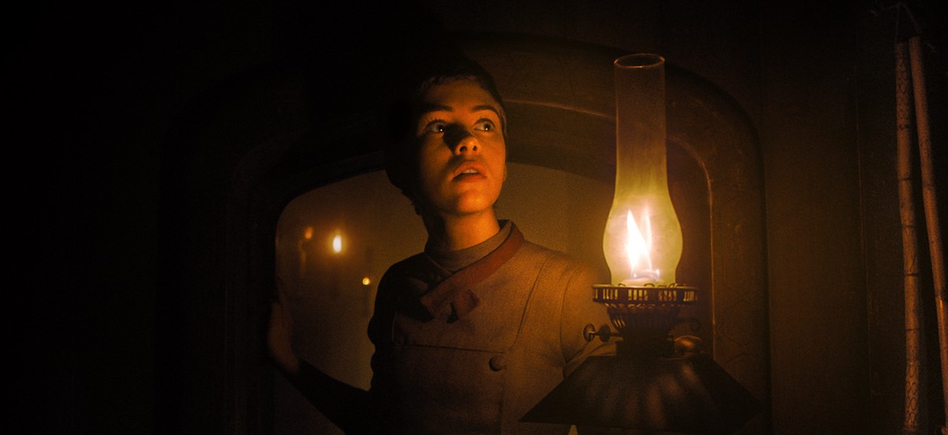
Gretel and Hansel: Vessels of Interpretation
Gretel and Hansel is just what I needed.
A bit of backstory: my father was admitted to the hospital the morning of January 30 with a brain bleed (the result of an arteriovenous malformation). The movement in his right side was impacted, along with his speech. Before I arrived at the ER, my mind was swirling with reflections on my own mortality. My birth-mother died in January 2001, and returning to the hospital to see my father in a compromised state caused my mind to flush with a surreal pressure.
He passed on February 9, and was buried on Valentine’s Day.
I keep returning to the cruel, random injustice of what happened: as a UCC minister, he used his voice, mind, and writing skills on a daily basis. He set track records at Juniata College, and maintained an active exercise regimen until the bleed struck him down.
I found myself wondering, “what happens when the storytellers pass?” My father’s sermons were grounded in scripture, philosophy, and his own unique take on human behavior. (As a kid, I always liked it when he referenced movies.) He didn’t approach religion from a place of dogmatic control and selfishness. Instead, he looked to open the minds of his parishioners. Though he was never one to boast that “God” (or the concept of) was “working through him,” his occupation was ultimately a vessel of interpretation.
Horror Alchemy
Osgood Perkins is a similar vessel of interpretation. There is an alchemy to his filmmaking that brushes aside the cliché and predictable. He considers the alternate angles of well-trod territory, and rejects lazy fan service. For those willing to accept his conditions, there’s a mind-opening world out there. (A Sunday sermon requires patience to get through, and Perkins is no less demanding a storyteller.)
The tale of “Hansel and Gretel” – and its “don’t talk to strangers” thesis – seemed ancient even when I was a kid. Most cinematic attempts to update fairy tales (the Twilight-tinged Red Riding Hood; the R-rated Hansel and Gretel: Witch Hunters) subsist on an incendiary “cool factor” instead of creating something endearing. This particular story exploits a childish naivete that eventually forces a survival scenario where the titular kids must “grow up” in order to self-preserve.
While my relationship with my father wasn’t perfect, his passing made me recognize just how much he gave me: writerly ambition, an interest in philosophy, and a demeanor that resists the trap of extreme viewpoints. He always approached things from the center, which allowed him to connect with a wide-ranging collection of people.
Gretel the Great
The Gretel of Perkins’ tale is stoic, but not apathetic. It’s a tricky rendition of the character, but one reflective of our current society, which thrives on mankind’s ability to be divisive, argumentative, and cruel for its own sake. Gretel is young yet weathered. By her subtle vocal and physical inflections, we know she’s seen far too much for her age (at one point, she’s propositioned by a syphilitic aristocrat). She’s been forced to grow up and rely on Survival Mode, with the added luggage of a younger sibling en tow.
Gretel and Hansel rejects fanciful notions of gingerbread houses adorned with colorful candy. The world it depicts is colored in earth tones, undercut with foreboding mist, and posited as a cold, suspicious place where “people who give, take something in return.”
The flipped title is apt: Gretel (Sophia Lillis, ascending to greatness) is at the forefront of this rendition. A few years older than her brother (Samuel Leakey), she’s savvy to the tricks of the grownup world, and sees herself as a protector to her sibling. There is no father in the story, and the children’s mother is presented in the throes of severe mental illness. An early scene reveals how long they’ve been living in these conditions: mother slams an ax into the dinner table, and the kids barely flinch.
Parental Guidance
With The Blackcoat’s Daughter, Perkins made one of the greatest horror films of the 2010s (if not all time). Its wintry atmosphere and seclusion conjured bone-chilling fear from the simplest of emotions: loneliness. Gretel and Hansel continues this fascination, looking at the fairy tale as a jumping-off point for two children left to fend for themselves in a hostile world.
As I watched, an unpleasant – yet essential – question forced its way into my mind: what happens to uswhen our parents and loved ones wind up in a state of total vulnerability?
I was fortunate enough to have a good relationship with my father – we never had arguments that led to extended periods of radio silence. I would ask him for second opinions on various things, and he’d always be there to reinforce my thinking or present an alternate angle. Up until he passed, he was willing to field my questions on…anything, really.
Holda (Alice Krige) is the lone resident of an A-frame-style home deep in the woods. In another reflection of this dreary world, the house smells of cake and bacon, but the architecture is too coldly abstract to be carnival-enticing. Only the most desperate children would make a stop at such a foreboding residence, and the promise of a banquet lulls Gretel and Hansel inside.
Rob Hayes’ script presents Holda as a figure as wise and world-weary as Gretel, which is why the interplay between these characters is so matter-of-fact. Both are keenly aware of the power each possesses. The struggle between parent/mentor and child is deeply felt, drawing into question Gretel’s devotion to Hansel. Throughout, Perkins never confuses the matter-of-fact tone with simple apathy.
Monsters Under the Bed
There is real horror in the hooded figures in the forest, and the darkness of night is threatening in a “monsters under the bed” sense. The camera looks up: from the ground to the characters; from the characters to the bare branches of trees overhead. The world is large to the point of being overwhelming – there’s a loneliness to all that uncharted wilderness.
Then there’s the repeated motif of Gretel, walking toward the camera, stepping into the unknown before we get a chance to see the path unfolding before her. Is there danger? It doesn’t matter. She does what she must to persevere. Perkins presents this action in a way that fosters hope instead of cynicism. Gretel is not without fear and doubt; it’s her ability to move forward that’s inspiring.
Gretel and Hansel is what I needed during one of the most difficult weeks of my life. It forced me to come to an understanding with my own fears, which had evolved from monsters under the bed to the finite lifespans of loved ones, and the mysterious nature of mortality itself. Sometimes, the paradoxical horror and beauty of the human condition is an emotionally vaporizing power unto itself.
4 out of 5 stars
The Plot Sickens: Jonny Numb brings you Oddities and Outliers…
Crash Analysis Support Team
Jonny Numb

Jonny Numb (aka Jonathan Weidler) never learned how to swim, but can float just fine. He co-hosts The Last Knock podcast with Billy Crash, and can be found in the social-media sewers of Twitter and Letterboxd @JonnyNumb.
Get your Crash Palace and The Last Knock gear! 
THE LAST KNOCK horror podcast is a Crash Palace Productions’ featured show. Besides this site, you can find THE LAST KNOCK on iTunes with new shows posted every other Sunday at 9 PM ET.
Crash Palace Productions website design and creation from Brian Yount Digital Enterprises with banner and THE LAST KNOCK art from Palko Designs. Logo designs from Paul Belci.
(Gretel and Hansel still from Orion Pictures.)
